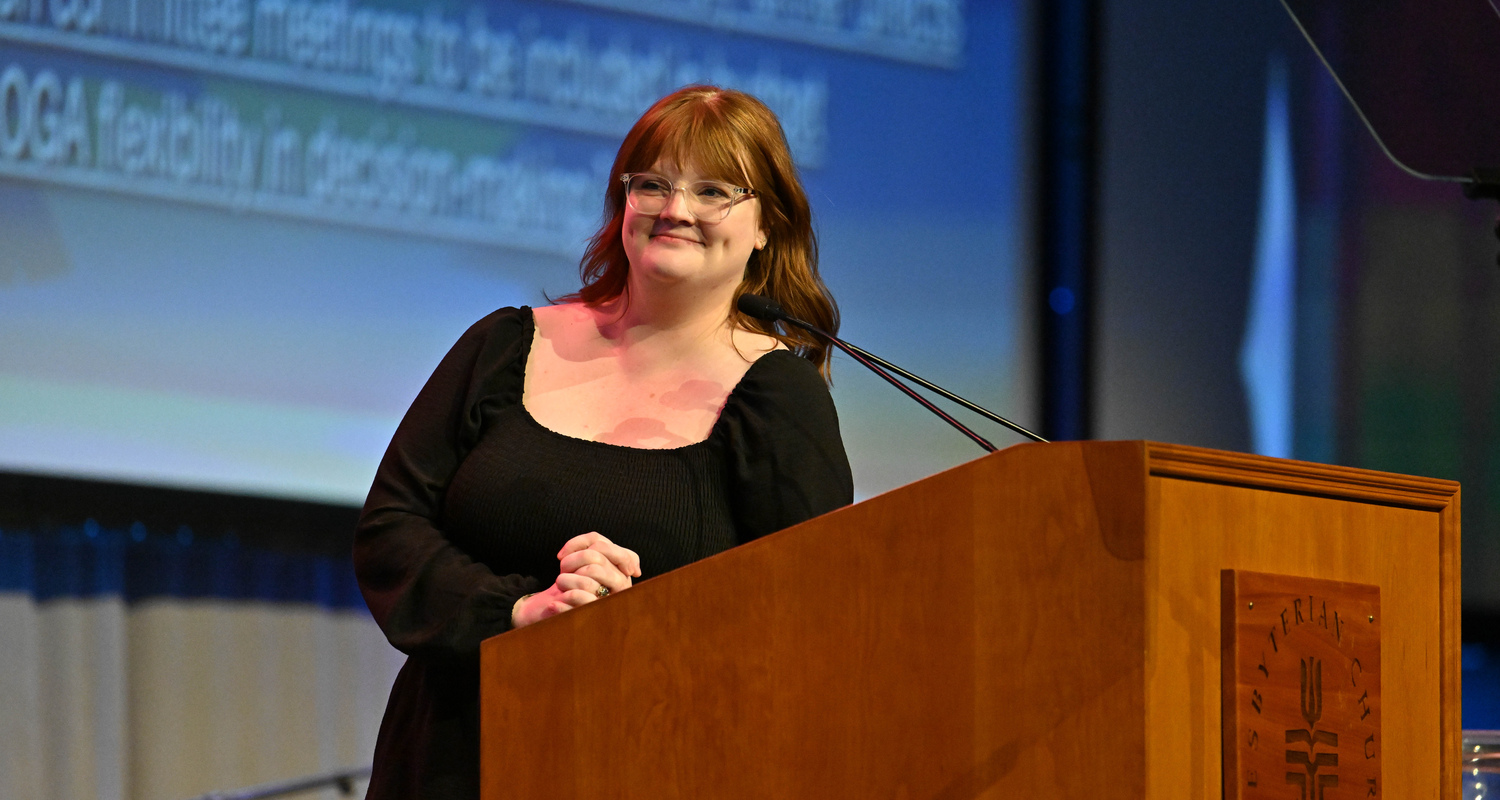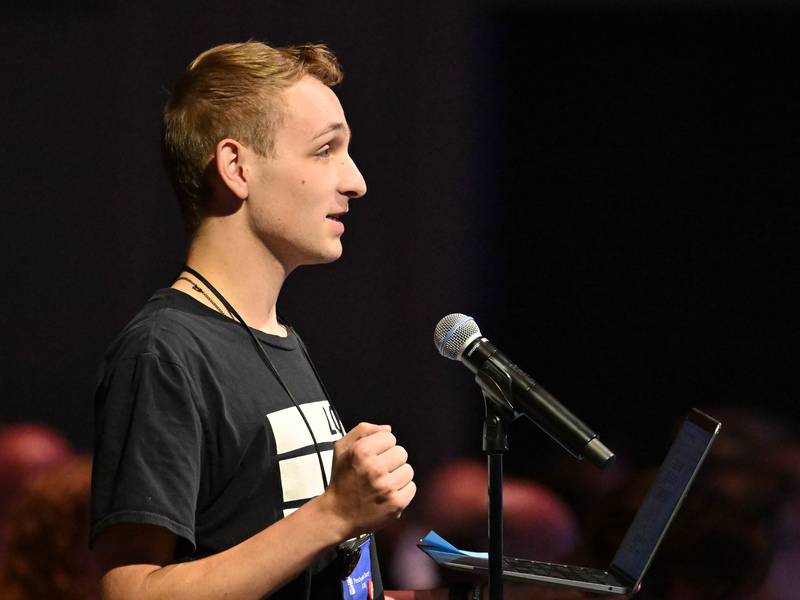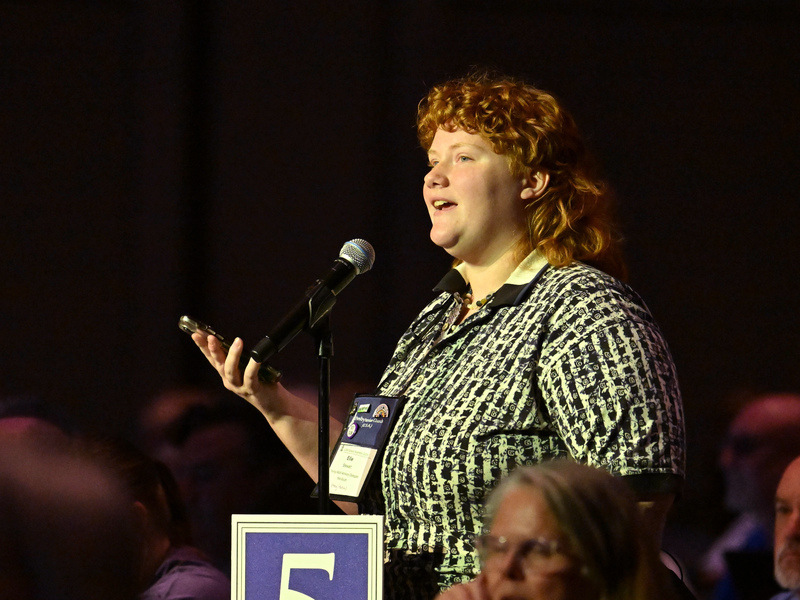
Kate Trigger-Duffert, director of General Assembly Planning in the Office of the General Assembly, answers questions from the Assembly while review business of the General Assembly Procedures committee during the 11th plenary meeting on July 3, 2024. Photo by Rich Copley
The 226th General Assembly voted Wednesday to accept the Presbytery of Milwaukee’s invitation to host the next General Assembly and rejected an effort to get the whole event to be held in-person.
Commissioners voted 413-3 to have the 227th General Assembly in Milwaukee, with online committees taking place from June 23-25, and in-person plenaries happening June 28-July 2.
The Milwaukee item, GAP-01, from the Committee on General Assembly Procedures (GAP), was part of a sprawling afternoon docket that also included several items from the Polity Committee, which had passed its most controversial item, known as the Olympia Overture, earlier that morning.
Once the rest of the Polity Committee’s docket was disposed of, the Assembly moved on to GAP business. During that time, an effort to get the Assembly format changed so that both the committee meetings and plenaries would be in-person failed 95-323 after officials responded to several questions prompted by a motion from Ruling Elder Commissioner Kemper Dyson of the Presbytery of Carlisle.
Dyson’s motion, PLEN-101, called for the current General Assembly to express its sense that, if logistically feasible and practical, both committee and plenary sessions of the 227th General Assembly be held in person and for the Committee on the Office of the General Assembly, or its unified successor, to make the final determination on feasibility.
After a vote to suspend the rules in order to consider the motion, Dyson explained to fellow commissioners that the motion was motivated by a feeling that in-person committees provide a better opportunity to build relationships. At least, that was Dyson’s experience while taking part in the 225th General Assembly in Louisville.
“While virtual meetings may be the easier route for the Assembly to take, it's not in the best interest of the Assembly,” said Dyson, adding that the ability to make new friends was limited at this General Assembly because there “was really no way to message or contact fellow committee members.”
Associate Stated Clerk Kate Trigger-Duffert, director of General Assembly Planning in the Office of the General Assembly, acknowledged that communication was limited between committee members but said that’s being worked on. “The idea was to try and keep conversation to the process during committee meetings,” she said. “But the idea of having ways for people to connect both virtually and when we come back together in person are things that are already on our list to consider and implement for the next Assembly.”
Another person who offered input was Ian Hall, a corresponding member of the Presbyterian Church (U.S.A.) A Corp., who estimated that by having a portion of this year’s Assembly online “we saved $1 million and that wasn’t in the budget at this time.”
Ellie Stewart, a Young Adult Advisory Delegate (YAAD) from Mid-South Presbytery, spoke in favor of the motion, saying “I think that the community aspect of having things in person is incredibly significant. When issues came up, whether they were interpersonal or otherwise, it was hard to find community and hard to access resources that made things better.”

Kemper Dyson, a ruling elder commissioner, addresses the General Assembly during the 11th plenary meeting on July 3, 2024. Photo by Rich Copley

Ellie Stewart, a Young Adult Advisory Delegate (YAAD), speaks in favor of proposed item of business during the 11th plenary meeting on July 3, 2024. Photo by Rich Copley.
But the motion was unsuccessful as was an attempt to upend a proposal from the Special Committee on Standing Rules to move the moderator election to the end of the Assembly. In GAP-03, the committee had proposed several changes on how business is done by the Assembly.
Jenny Wells, a teaching elder and commissioner from Heartland Presbytery, submitted a motion to hold the moderator election at the beginning of the Assembly, as it was done this year.
“Keeping the election at the beginning of the Assembly gives the current Assembly the gift of electing those who will help guide them through the meeting rather than having the current assembly elect the moderators for the next Assembly,” Wells said. “While I understand the sentiment of the special committee in making this change, I believe that we greatly benefit from our moderators having served as commissioners among us during the current Assembly.”
Teaching Elder Cindy Kohlmann, co-moderator of the Special Committee and co-moderator of the 223rd General Assembly (2018), explained that having the election at the end would allow co-moderator candidates to finish their roles as active commissioners, serving on committees and participating in debate in plenary sessions. “Also, we heard the value of the newly elected moderators being able to participate in planning for the Assembly they would moderate. It would also give them an opportunity to prepare for that moderating which, as we know, requires a lot of parliamentary procedure and crash courses.”
Mairead Brock, a YAAD from the Presbytery of Western North Carolina, was not swayed.
“Having your election at the beginning when we've been able to have conversation with you and form a relationship with you is incredibly important to making sure that our voices are heard in plenary,” knowing “that is all we have to influence what goes on here on the floor,” Brock said.
Nevertheless, the amendment failed by a close vote of 198-201.
